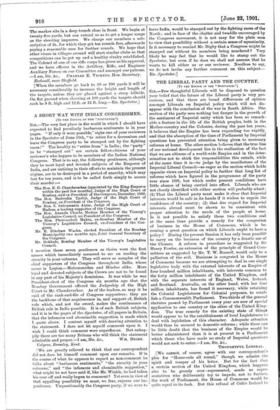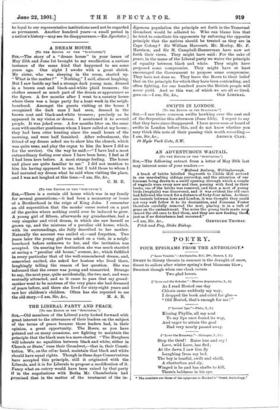THE LIBERAL PARTY AND THE COUNTRY.
go THE EDITOR OP THE "SPECTATOR."]
Sin,—Few thoughtful Liberals will be disposed to question
your belief that the future of the Liberal party is very pre- carious, and that there are broad differences of opinion amongst Liberals on Imperial policy which will not dis- appear with the conclusion of the war in South Africa. One section of the party sees nothing but danger in the growth of the sentiment of Imperial unity which has been so remark- able a feature in the life of the British peoples, both in the Mother-country and the Colonies, during the past ten years; it believes that the Empire has been expanding too rapidly, and that the absorption of the time of Parliament by Imperial questions has prevented attention being given to necessary reforms at home. The other section believes that the true line of our national development lies in the realisation of the fact that we are citizens of a world-wide Empire and in the deter- mination not to shirk the responsibilities this entails, while at the same time it is—to judge by the manifestoes of the Imperial Liberal Council—as eager as the section which holds opposite views on Imperial policy to further that long list of reforms which have figured in the programme of the party ever since 1891, but which under present conditions have little chance of being carried into effect. Liberals who are not closely identified with either section will probably admit: (1) That the Liberal party must make it clear that Imperial interests would be safe in its hands if it wishes to regain the confidence of the country; (2) that due regard for Imperial interests abroad must be shown to be consistent with proper attention to the needs of the people at home. Is it not possible to satisfy these two conditions and at the same time provide a remedy for the congestion of business in the House of Commons, which is be- coming a great question on which Liberals ought to have a policy ? During the present Session it has only been possible to carry on the business of the country by a drastic use of the Closure. A reform in procedure as suggested by Sir Henry Fowler, an extension of the principle of Grand Com- mittees as suggested by Mr. T. W. Russell, would only be a. palliation of the evil. Business is congested in the House of Commons because we are attempting to deal in one single
legislative body with the external interests of an Empire of four hundred million inhabitants, with interests common to the forty million inhabitants of the United Kingdom, and with the separate interests of England, Wales, Ireland,
and Scotland. Australia, on the other hand, with her four million inhabitants, has found it necessary, while retaining the Colonial Legislatures for Colonial purposes, to estab- lish a Commonwealth Parliament. Two-thirds of the general statutes passed by Parliament every year are now of special application to one country or the other of the United King- dom. The true remedy for the existing state of things would appear to be the establishment of local Legislatures to deal with legislation of this character. Adequate attention would thus be secured to domestic reforms ; while there can be little doubt that the business of the Empire would be better administered than it is at present in a Parliament which those who have made no study of Imperial questions would not seek to enter.—I am, Sir, &c.,
THOUGHTFUL LIBERAL.
[We cannot, of course, agree with our correspondents plea for "Home-rule all round," though we admire the spirit and temper of his letter. But for the fact that a certain section of the United Kingdom, which happens also to be grossly over - represented, sends us repre- sentatives who deliberately try to impede, not to further, the work of Parliament, the House of Commons would be quite equal to its task. But this refusal of Celtic Ireland to be loyal to our representative institutions need not be regarded as permanent Another hundred years—a small period in a nation's history—may see its disappearance.—En. Spectator.]











































 Previous page
Previous page